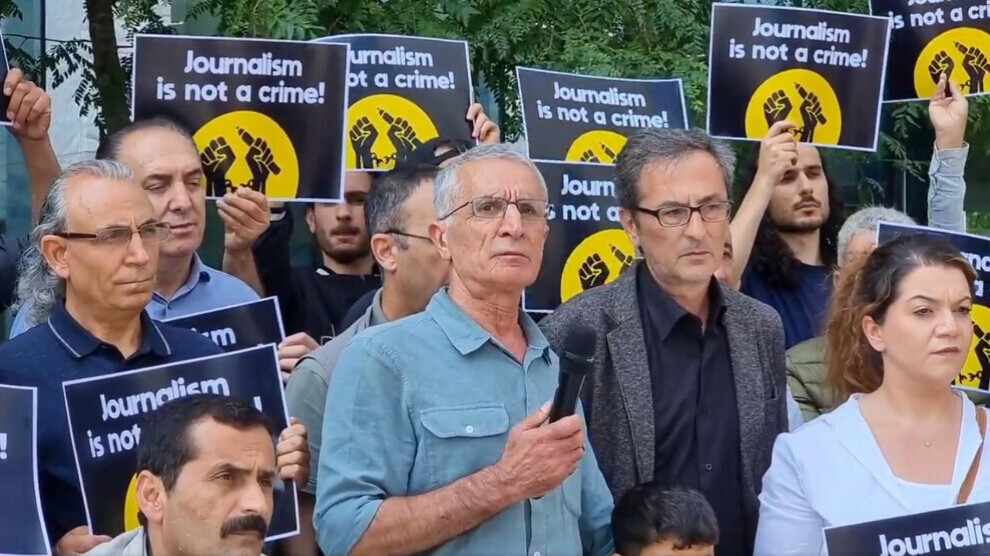Court decision on extradition of Kurdish journalist Serdar Karakoç postponed
The court decision on the extradition of Kurdish journalist Serdar Karakoç from the Netherlands to Germany has been postponed until 7 August.
The court decision on the extradition of Kurdish journalist Serdar Karakoç from the Netherlands to Germany has been postponed until 7 August.

A court hearing took place today in Amsterdam in the extradition hearing against Serdar Karakoç. The Kurdish journalist was arrested at his home in the Netherlands on 23 May at the request of Germany. On 14 June he was provisionally released on bail of 5000 euros. His passport was confiscated, he is not allowed to leave the country and has to sign in at the police station once a week. The 64-year-old journalist is being investigated in Germany under Law 129b for alleged membership of the Kurdistan Workers' Party (PKK).
Dozens of media professionals and activists, some of whom travelled from other countries for the hearing, gathered in front of the court building in Amsterdam. The ‘Freedom for Serdar Karakoç’ initiative called for solidarity with the journalist and protest against Germany's criminalisation policy. Only a small group was able to observe the trial.
At the beginning of the hearing, the court explained that the Dutch judiciary was only examining the extradition request and was not dealing with the German allegations. Germany is accusing Karakoç of working for a terrorist organisation, an accusation that is not made in the Netherlands.
Serdar Karakoç's lawyers stated that their client was only accused of journalistic and political activities in Germany, underlining that this work could not be linked to terrorism. The lawyers pointed out the close connection between Germany and Turkey and expressed the assumption that the German criminal proceedings were opened at Turkey's request.
The lawyers demanded that Germany's request for the handover of Serdar Karakoç be rejected.
Speaking after, Karakoç said that he had initially worked as a journalist in Turkey and then also in Europe after his escape. “I have lived in the Netherlands for over twenty years. During this time, I often travelled to Germany, France and other countries, including during the alleged period of the crime from 2017 to 2018 and afterwards. The main reason for my travels was my journalistic work. I also have relatives living in Germany. Although my work is open to the public, the German state is trying me under Law 129b, i.e. for membership of a terrorist organisation.”
Stating that the concept of terrorism should be well explained, journalist Karakoç said that even Turkey associates the concept of terrorism with violence. He emphasised that there was no act of violence in the case in which he stood trial in Germany and that he was doing journalism. He stated that according to German law, he should not be tried under Law 129b.
Karakoç reminded of the decisions by different European courts in 2014 and 2018 stating that ‘the PKK is not a terrorist organisation’ and underlined that the PKK is not a banned organisation.
Referring to the content of the Law 129b in Germany, which criminalises the democratic activities of the Kurdish community, Serdar Karakoç stated that Germany is trying to portray the entire Kurdish people as terrorists by using their democratic and legal activities as an excuse. He said that journalistic activities are also dealt with within the scope of Law 129b and that this is unacceptable.
Pointing to Turkish intelligence service MİT's organisation in Europe, Karakoç recalled the two massacres in Paris and the assassination attempts against Kurdish politicians in Brussels.
Pointing to MİT's activities in Germany, Karakoç said, ‘According to the previous official reports of Germany, 6 thousand MİT members are active in Germany. These people have repeatedly threatened Kurdish, opposition figures, politicians and journalists. I have been in Germany many times to investigate this situation and to make interviews with the threatened people. There were also German MPs who were threatened, I also interviewed them. Therefore, it is certain that the Turkish State has a hand in the case against me.”
After Serdar Karakoç's defence, the court decided to continue judicial control conditions. The court announced that it will make a final decision on whether to extradite him to Germany on 7 August.